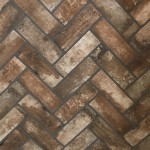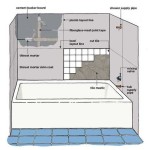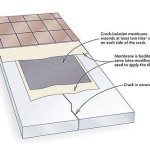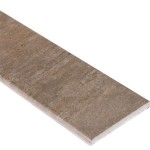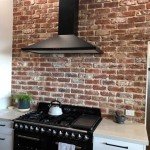The Incredible Benefits Of Stone Veneer Tiles In Bathrooms
Stone veneer tiles are becoming increasingly popular for bathroom renovations and new constructions. This material offers a unique blend of aesthetic appeal, durability, and practicality, making it an attractive alternative to traditional bathroom tiling options. Stone veneer provides the visual richness and texture of natural stone without the excessive weight and cost typically associated with solid stone slabs. This facilitates easier installation, broader application possibilities, and a more accessible price point for homeowners and construction professionals alike.
The composition of stone veneer typically involves a thin layer of natural stone adhered to a manufactured backing. This backing can vary, often utilizing cement, lightweight concrete, or other composite materials. The exact composition influences several characteristics, including weight, ease of cutting, and water resistance. Understanding the different types of stone veneer and their specific properties is crucial for selecting the appropriate material for a bathroom environment, where moisture and humidity are constant concerns.
Furthermore, the aesthetic versatility of stone veneer allows for diverse design implementations. From rustic, textured surfaces to sleek, contemporary aesthetics, stone veneer can complement a wide range of bathroom styles. The natural variations in color and pattern inherent in stone ensure that each installation possesses a unique character, adding a touch of organic beauty to the space. Coupled with its functional advantages, this aesthetic flexibility positions stone veneer as a prominent material choice for modern bathroom design.
Enhanced Aesthetic Appeal and Design Versatility
One of the primary advantages of stone veneer tiles in a bathroom setting is their capacity to elevate the aesthetic appeal of the space. The natural textures and color variations of stone create a sense of luxury and sophistication. Unlike uniform ceramic or porcelain tiles, stone veneer offers a visual complexity that is both inviting and visually engaging. This inherent aesthetic quality can transform a mundane bathroom into a sanctuary of relaxation and style.
The design versatility of stone veneer extends beyond mere aesthetics. The tiles are available in various shapes, sizes, and profiles, enabling a wide range of design possibilities. Larger format tiles can create a sense of spaciousness, while smaller, more intricate designs can add a decorative touch. Furthermore, stone veneer can be used to create accent walls, shower surrounds, backsplashes, and even vanity surfaces, providing a cohesive and visually harmonious design throughout the bathroom.
Moreover, the availability of different stone types, such as slate, granite, limestone, and travertine, allows for further customization. Each stone type possesses unique characteristics in terms of color, texture, and veining, enabling homeowners and designers to select the perfect material to complement their overall design vision. Whether the objective is to achieve a rustic, earthy aesthetic or a sleek, modern appearance, stone veneer offers the flexibility to realize a wide spectrum of design concepts.
The integration of stone veneer with other bathroom elements, such as lighting, fixtures, and accessories, further enhances its aesthetic impact. Strategically placed lighting can accentuate the textures and colors of the stone, creating a dramatic and inviting atmosphere. The natural tones of stone veneer often complement metallic finishes, such as brushed nickel, chrome, or oil-rubbed bronze, creating a sophisticated and harmonious visual balance.
Durability and Moisture Resistance
The bathroom environment presents unique challenges due to its constant exposure to moisture and humidity. Selecting materials that can withstand these conditions is crucial for ensuring the longevity and performance of the bathroom. Stone veneer tiles, when properly installed and sealed, offer excellent durability and moisture resistance, making them a suitable choice for this demanding environment.
The inherent properties of natural stone contribute to its durability. Stone is a naturally hard and resilient material that can withstand the daily wear and tear associated with bathroom use. It is resistant to scratches, stains, and fading, ensuring that the aesthetic appeal of the stone veneer remains intact for years to come. This durability minimizes the need for frequent repairs or replacements, providing a cost-effective solution in the long term.
To enhance the moisture resistance of stone veneer in a bathroom setting, proper sealing is essential. Applying a high-quality sealant to the surface of the stone creates a protective barrier that prevents water from penetrating the material. This barrier helps to prevent the growth of mold and mildew, which can be a common problem in bathrooms. Sealants are available in various formulations, and selecting the appropriate sealant for the specific type of stone veneer is crucial for optimal performance.
The backing material used in stone veneer also plays a significant role in its moisture resistance. Backing materials such as cement board or lightweight concrete are inherently water-resistant and provide a stable and impermeable substrate for the stone veneer. These materials prevent moisture from wicking through the veneer and damaging the underlying wall structure. Proper installation techniques, including the use of waterproof membranes and sealants, further enhance the overall moisture resistance of the system.
Furthermore, regular cleaning and maintenance can help to preserve the durability and moisture resistance of stone veneer in a bathroom. Using mild, non-abrasive cleaners and avoiding harsh chemicals can prevent damage to the stone and the sealant. Promptly addressing any leaks or spills can also prevent water damage and the growth of mold and mildew. With proper care, stone veneer can provide a durable and moisture-resistant surface for many years.
Ease of Installation and Cost-Effectiveness
Compared to installing solid stone slabs, stone veneer tiles offer significant advantages in terms of ease of installation and cost-effectiveness. The lightweight nature of stone veneer makes it easier to handle and install, reducing labor costs and project timelines. Furthermore, the lower material costs associated with stone veneer make it a more affordable alternative to solid stone, allowing homeowners to achieve a high-end aesthetic without exceeding their budget.
The reduced weight of stone veneer is a key factor in its ease of installation. Solid stone slabs can be extremely heavy and require specialized equipment and skilled labor to handle and install. Stone veneer, on the other hand, is significantly lighter, making it easier for contractors to maneuver and position the tiles. This reduced weight also simplifies the preparation of the substrate, as the wall structure does not need to bear the same load as with solid stone.
The installation process for stone veneer typically involves adhering the tiles to a prepared substrate using a thin-set mortar. The substrate should be clean, dry, and structurally sound to ensure proper adhesion. The thin-set mortar is applied to the back of the stone veneer tile, and the tile is then pressed firmly against the substrate. Spacers are often used to maintain consistent grout lines between the tiles. After the mortar has cured, the grout lines are filled with a suitable grout, and the surface is cleaned.
The cost-effectiveness of stone veneer stems from both lower material costs and reduced labor costs. The cost of stone veneer is typically significantly lower than the cost of solid stone slabs. This is because stone veneer utilizes a thinner layer of natural stone, reducing the amount of material required. Furthermore, the reduced weight and ease of installation of stone veneer translate into lower labor costs, as the project can be completed more quickly and with less specialized equipment.
In addition to lower material and labor costs, stone veneer can also contribute to energy savings. Stone is a natural insulator, and stone veneer can help to reduce heat loss in the winter and heat gain in the summer. This can lead to lower energy bills and a more comfortable living environment. While the insulating properties of thin veneer may not be as pronounced as solid stone walls, the cumulative effect over a large surface area can still be noticeable.
Overall, the ease of installation and cost-effectiveness of stone veneer tiles make them an attractive option for bathroom renovations and new constructions. The reduced weight, simpler installation process, and lower material costs make stone veneer a more accessible and affordable alternative to solid stone, without compromising on the aesthetic appeal and durability of the finished product.

Beautifully Designed Natural Stone Bathrooms And Showers

Advantages Of L And Stick Thin Stone Veneers Decor Slimstone

Advantages Of L And Stick Thin Stone Veneers Decor Slimstone

Is Natural Stone Cladding Worth It

Veneer Sheets Slim Stone Supplier And Manufacturers In

How To Fit Stone Wall Cladding Tilesporcelain

Natural Stone Ledger Panels Outdoors In Transformation

Beautifully Designed Natural Stone Bathrooms And Showers

Bathroom Shower Vinyl Wall Panel Vs Tiles Which One Should You Choose Step Guard Floors

Stone Veneer Suppliers In Manufacturers Slateskin
Related Posts

